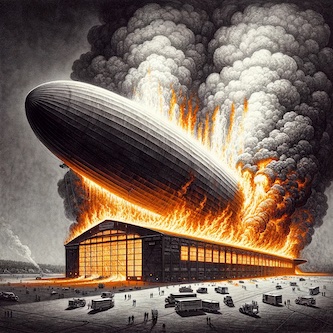A historic former blimp hangar in Tustin, California, has been destroyed by a fire. The hangar, which was used to house blimps during World War Two and later became a set for various film and TV shows, was engulfed in flames. The cause of the fire is under investigation, and fortunately, no injuries have been reported. The local fire authority decided that the best course of action was to allow the building to collapse.
The massive wooden structure, one of two at the former Marine Corps Air Station Tustin, had a significant historical and cultural significance. It is unfortunate that this piece of history has been lost in the fire. The hangar had been repurposed for various uses over the years, and its destruction is a loss for the community.
The fire has sparked an investigation to determine the cause of the blaze. The authorities are working to understand how the fire started and to prevent such incidents in the future. The loss of the historic hangar is a reminder of the importance of fire safety and the preservation of historical landmarks.
The hangar’s destruction has left a void in the community, and efforts to rebuild or preserve its memory may be considered. It is a reminder of the need to protect and preserve historical structures for future generations. The community may come together to honor the hangar’s legacy and explore ways to commemorate its historical significance.
Original news source: Massive blimp hangar engulfed in flames (BBC)
Listen
Slow
Normal
Fast
Group or Classroom Activities
Warm-up Activities:
– News Summary
Instructions: Students will be divided into small groups. Each group will be tasked with summarizing the article in their own words, condensing the information into just five sentences. Afterward, each group will present their summary to the class, and the class will discuss the different approaches to summarization and the key points identified by each group.
– Headline Creation
Instructions: In pairs, students will create multiple headlines for the article that capture the main event in a compelling way. Encourage them to play with language and come up with both straightforward and more creative or sensational headlines. After creating their headlines, pairs will share them with the class, and the class will vote on which headlines are the most effective and why.
– Opinion Spectrum
Instructions: Pose a statement related to the article, such as “Historical landmarks should be prioritized for preservation over other types of buildings.” Have students physically place themselves along a line in the classroom that represents a spectrum from “strongly agree” to “strongly disagree.” Students will then discuss their positions with their nearest neighbors and later share their viewpoints and reasoning with the class as a whole.
– Future Predictions
Instructions: Students will individually write a short paragraph predicting the future of the site where the blimp hangar stood. They should consider how the community might commemorate the hangar, what type of investigation results might come out regarding the fire, and what safety measures could be implemented in the future. After writing their predictions, students will share them in small groups and discuss the likelihood and implications of each other’s ideas.
– Mind Map
Instructions: In small groups, students will create a mind map on a large piece of paper, starting with the blimp hangar at the center. Branching out from the hangar, they will add nodes for key elements such as historical significance, cultural impact, the fire, the investigation, community response, and preservation. Each node should have sub-nodes with relevant details from the article. Once completed, each group will present their mind map, explaining the connections and details they included.
Comprehension Questions:
1. What was the original use of the blimp hangar in Tustin, California?
2. For what purposes was the hangar used after World War Two?
3. What was the response of the local fire authority to the blaze at the hangar?
4. How did the fire authorities decide to manage the burning structure?
5. What was the significance of the hangar that was destroyed by the fire?
6. What actions are being taken following the fire at the historic hangar?
7. How has the community been affected by the destruction of the blimp hangar?
8. What might the community consider doing in response to the loss of the hangar?
Go to answers ⇩
Listen and Fill in the Gaps:
A historic (1)______ blimp (2)______ in (3)______, (4)______, has been destroyed by a fire. The hangar, which was used to house blimps during World War Two and later became a set for various film and TV shows, was engulfed in flames. The cause of the fire is under investigation, and fortunately, no injuries have been reported. The local fire authority decided that the best course of (5)______ was to allow the building to collapse.
The massive (6)______ structure, one of two at the former Marine Corps Air Station Tustin, had a significant historical and cultural significance. It is unfortunate that this (7)______ of history has been lost in the fire. The hangar had been repurposed for various uses over the (8)______, and its destruction is a loss for the community.
The fire has sparked an investigation to determine the cause of the blaze. The authorities are working to understand how the fire started and to (9)______ such (10)______ in the future. The loss of the historic hangar is a reminder of the (11)______ of fire safety and the (12)______ of historical landmarks.
The hangar’s destruction has left a void in the community, and efforts to rebuild or (13)______ its memory may be considered. It is a reminder of the need to protect and preserve (14)______ structures for future generations. The community may come together to (15)______ the hangar’s legacy and explore ways to commemorate its historical (16)______.
Go to answers ⇩
Discussion Questions:
Students can ask a partner these questions, or discuss them as a group.
1. What is your favorite historical landmark in your hometown, and how would you feel if it was destroyed by a fire?
2. How do you think a community should respond when a significant historical structure is lost?
3. Do you believe that old buildings have a cultural value that is worth preserving? Why or why not?
4. What measures do you think can be taken to prevent fires in historic structures?
5. Have you ever visited a place that was later destroyed or significantly altered? How did that make you feel?
6. Do you think that repurposing historical buildings is a good way to preserve them, or does it take away from their historical value?
7. How important do you think it is for schools to teach students about local history and landmarks?
8. What is an example of a historic event or era that you find particularly interesting, and why?
9. Do you think modern architecture will be valued as historical landmarks in the future? Why or why not?
10. How would you feel if a film or TV show was set in a historic place from your country?
11. In your opinion, what makes a building or structure worthy of being preserved as a historical landmark?
12. Have you ever been involved in efforts to preserve or restore a historic site? What was the experience like?
13. Do you think there is enough awareness about fire safety in relation to historic buildings in your community?
14. How do you think the loss of a historic structure affects the identity of a community?
15. Do you think the media gives adequate coverage to the destruction of cultural and historical sites? Why or why not?
Individual Activities
Vocabulary Meanings:
Match each word to its meaning.
Words:
1. hangar
2. fire
3. investigation
4. historical
5. community
6. preserve
7. destruction
8. landmark
Meanings:
(a) The act or process of searching for facts
(b) A place to store aircraft
(c) A group of people living in the same place
(d) A structure or place with historical importance
(e) A burning mass of material
(f) The action of causing severe damage
(g) Related to the past
(h) To maintain something in its original state
Go to answers ⇩
Multiple Choice Questions:
1. What was the former use of the historic hangar in Tustin, California?
(a) A film and TV set
(b) A community center
(c) A shopping mall
(d) Housing blimps during World War Two
2. What was the cause of the fire at the historic hangar?
(a) Arson
(b) Under investigation
(c) Electrical malfunction
(d) Lightning strike
3. How many hangars were there at the former Marine Corps Air Station Tustin?
(a) Two
(b) Three
(c) Four
(d) One
4. What is the current status of the investigation into the fire?
(a) Completed
(b) Inconclusive
(c) Suspended
(d) Underway
5. What is the significance of the hangar’s destruction?
(a) No impact on the community
(b) Positive impact on the community
(c) Loss of historical and cultural significance
(d) Increase in property value
6. What is the focus of the authorities’ efforts after the fire?
(a) Rebuilding the hangar
(b) Selling the land
(c) Understanding the cause and preventing future incidents
(d) Ignoring the issue
7. What is the community’s potential response to the hangar’s destruction?
(a) Ignoring the loss
(b) Rebuilding or preserving its memory
(c) Selling the land for development
(d) Forgetting about the hangar’s historical significance
8. What is the lesson to be learned from the hangar’s destruction?
(a) The importance of fire safety and preservation of historical landmarks
(b) The insignificance of historical structures
(c) The need to demolish other historical landmarks
(d) The lack of community involvement in historical preservation
Go to answers ⇩
True or False Questions:
1. The hangar was used to house blimps during World War Two and later became a set for various film and TV shows.
2. Efforts to rebuild or destroy the hangar’s memory may be considered.
3. The hangar had significant historical and cultural significance.
4. The local fire authority decided to prevent the building from collapsing.
5. A historic former blimp hangar in Tustin, California, was destroyed by a fire.
6. The cause of the fire is not under investigation and injuries have been reported.
7. The community may come together to honor the hangar’s legacy and explore ways to commemorate its historical significance.
8. The fire has not sparked an investigation to determine the cause of the blaze.
Go to answers ⇩
Write a Summary:
Write a summary of this news article in two sentences.
Check your writing now with the best free AI for English writing!
Writing Questions:
Answer the following questions. Write as much as you can for each answer.
Check your answers with our free English writing assistant!
1. What was the original purpose of the historic blimp hangar in Tustin, California?
2. Can you list some of the uses the Tustin hangar had after World War Two?
3. What actions did the local fire authority take during the fire at the former blimp hangar?
4. What is the current status of the investigation into the cause of the fire that destroyed the Tustin hangar?
5. How might the community respond to the loss of the historic hangar in terms of rebuilding or commemorating its significance?
Answers
Comprehension Question Answers:
1. What was the original use of the blimp hangar in Tustin, California?
The blimp hangar in Tustin, California, was originally used to house blimps during World War Two.
2. For what purposes was the hangar used after World War Two?
After World War Two, the hangar was repurposed and became a set for various film and TV shows.
3. What was the response of the local fire authority to the blaze at the hangar?
The local fire authority decided that the best course of action was to allow the building to collapse.
4. How did the fire authorities decide to manage the burning structure?
The fire authorities decided to let the building collapse as their course of action.
5. What was the significance of the hangar that was destroyed by the fire?
The hangar had significant historical and cultural significance, as it was a historic former blimp hangar from World War Two and had been used for various purposes over the years.
6. What actions are being taken following the fire at the historic hangar?
An investigation has been sparked to determine the cause of the fire and to understand how the fire started, with the aim of preventing such incidents in the future.
7. How has the community been affected by the destruction of the blimp hangar?
The community has been left with a void due to the loss of the historic hangar, which was a piece of history and had been repurposed for various uses over the years.
8. What might the community consider doing in response to the loss of the hangar?
The community may come together to honor the hangar’s legacy and explore ways to commemorate its historical significance, possibly through rebuilding or preserving its memory.
Go back to questions ⇧
Listen and Fill in the Gaps Answers:
(1) former
(2) hangar
(3) Tustin
(4) California
(5) action
(6) wooden
(7) piece
(8) years
(9) prevent
(10) incidents
(11) importance
(12) preservation
(13) preserve
(14) historical
(15) honor
(16) significance
Go back to questions ⇧
Vocabulary Meanings Answers:
1. hangar
Answer: (b) A place to store aircraft
2. fire
Answer: (e) A burning mass of material
3. investigation
Answer: (a) The act or process of searching for facts
4. historical
Answer: (g) Related to the past
5. community
Answer: (c) A group of people living in the same place
6. preserve
Answer: (h) To maintain something in its original state
7. destruction
Answer: (f) The action of causing severe damage
8. landmark
Answer: (d) A structure or place with historical importance
Go back to questions ⇧
Multiple Choice Answers:
1. What was the former use of the historic hangar in Tustin, California?
Answer: (d) Housing blimps during World War Two
2. What was the cause of the fire at the historic hangar?
Answer: (b) Under investigation
3. How many hangars were there at the former Marine Corps Air Station Tustin?
Answer: (a) Two
4. What is the current status of the investigation into the fire?
Answer: (d) Underway
5. What is the significance of the hangar’s destruction?
Answer: (c) Loss of historical and cultural significance
6. What is the focus of the authorities’ efforts after the fire?
Answer: (c) Understanding the cause and preventing future incidents
7. What is the community’s potential response to the hangar’s destruction?
Answer: (b) Rebuilding or preserving its memory
8. What is the lesson to be learned from the hangar’s destruction?
Answer: (a) The importance of fire safety and preservation of historical landmarks
Go back to questions ⇧
True or False Answers:
1. The hangar was used to house blimps during World War Two and later became a set for various film and TV shows. (Answer: True)
2. Efforts to rebuild or destroy the hangar’s memory may be considered. (Answer: False)
3. The hangar had significant historical and cultural significance. (Answer: True)
4. The local fire authority decided to prevent the building from collapsing. (Answer: False)
5. A historic former blimp hangar in Tustin, California, was destroyed by a fire. (Answer: True)
6. The cause of the fire is not under investigation and injuries have been reported. (Answer: False)
7. The community may come together to honor the hangar’s legacy and explore ways to commemorate its historical significance. (Answer: True)
8. The fire has not sparked an investigation to determine the cause of the blaze. (Answer: False)
Go back to questions ⇧















